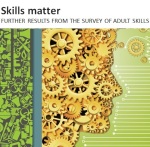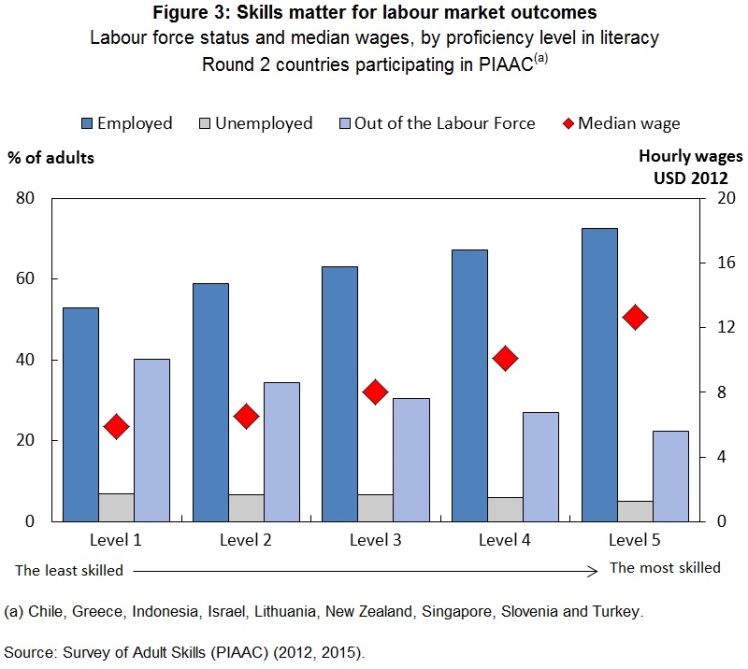The Survey of Adult Skills: nine more countries added on
[ad_1]
By Glenda Quintini.
Today, the OECD publishes Skills Matter: Further Results from the Survey of Adult Skills, the Second International Report for the Survey of Adults Skills – an international assessment of the proficiency of adults aged 16-65 years in three key information processing skills: literacy, numeracy, and problem solving in technology-rich environments. The first results from the Survey were released in October 2013 (OECD, 2013) and covered 25 countries and sub-national entities while the report released today covers a further nine countries and sub-national entities – Chile, Greece*, Indonesia (Jakarta), Israel**, Lithuania, New Zealand, Singapore, Slovenia and Turkey– that collected data in 2014-15.
As many of the posts on this blog confirm, the Survey of Adult Skills provides a very rich source of data for policy makers, analysts and researchers concerned with issues such as the development and maintenance of the skills of the population, the relationships between the education system and the labour market, the efficiency of the labour market in matching workers and jobs, and the links between skills and inequality and the social and labour market integration of certain sub-groups of the population such as immigrants. Beyond offering an insight into the level and distribution of information processing skills across the population as a whole and for key sub-groups, the Survey also provides valuable information on the benefits these skills provide in the labour market and in everyday life more broadly and the factors that influence their development and maintenance.
While still reporting values for all 34 countries/economies, the publication out today focuses more specifically on how the nine additional countries included in the second round of the Survey compare internationally.
No uniform patterns emerge for the new countries as a whole which is no doubt a reflection of how different the new countries are from each other (Figure 1).For example, adults in New Zealand score consistently above the OECD average in all three domains – including ranking at the top in problem solving in technology-rich environments and very close to the top in literacy. At the opposite end, Chile, Greece, Indonesia (Jakarta) and Turkey are consistently found at the bottom of the proficiency scales.
The remaining countries – Israel, Lithuania, Singapore and Slovenia – are somewhere in between, with mixed outcomes depending on the domain. Adults in Singapore, for instance, score significantly below the cross-country average in numeracy, close to the average in literacy, and significantly above the average in problem solving in technology-rich environments.
The differences between countries reflect, in part, the different starting points and pathways of economic, educational and social development that the countries/regions in the study have followed over the past half century as well as current institutional arrangements and policies. For example, the very rapid economic development and educational expansion over the post-war period experienced Singapore is reflected in low levels of educational attainment and proficiency among older generations and high attainment and proficiency among younger adults. In addition, the fact that the high average proficiency in literacy and numeracy is not necessarily accompanied by high proficiency in problem solving in technology-rich environments in some countries reflects the different historical patterns of the roll-out of access to ICTs in western European and former socialist countries for example.
Patterns of proficiency across socio-demographic groups are similar to those observed for Round 1 countries/economies (Figure 2). The difference in literacy proficiency between men and women is negligible. However, gender gaps in proficiency are more pronounced in numeracy and among older cohorts. This could reflect either the fact that gender gaps in educational attainment are wider, or that women’s skills depreciate more over time, possibly because they participate less in the labour market.
In general, proficiency peaks among adults aged around 30 years in the case of literacy and numeracy, and around 25 years in the case of problem solving in technology-rich environments. A substantial component of age-related differences in proficiency is associated with differences in the characteristics of adults in different age groups, particularly their level of educational attainment.
As would be expected, there is a very close association between the educational attainment of adults and their proficiency in information processing skills, in all countries. This is related to the fact that, on the one hand, adults with higher proficiency will be more likely to undertake higher levels of education and, on the other, longer periods of study provide the opportunity to further develop proficiency in information processing skills.
Socio-economic background and migration status also exert a significant influence on adults’ proficiency in literacy, with higher parental education and fluency in the assessment language associated with higher proficiency.
The survey of adult skills does not stop at providing a description of proficiency among the adult population. It also provides a rich source of data for analysing a number of labour market issues such as the relationship of proficiency in information processing skills and other dimensions of human capital to outcomes such as employment and wages, the extent to which worker’s use information processing skills in their jobs and the factors that encourage more frequent or less frequent use of such skills and the effectiveness of the labour market in ensuring a good match between workers’ qualifications and skills and the content of their jobs.
In terms of employment, across the countries in the Survey of Adults Skills, an adult who scores one standard deviation higher than another on the literacy scale (around 48 score points) is 8% more likely to be employed than unemployed on average, net of the impact of other factors, including educational attainment (Figure 3). The relationship between literacy proficiency and employment varies considerably between countries. Among Round 2 countries, the relationship between skills proficiency and the likelihood of employment is strongest in New Zealand, Lithuania and Turkey and weakest in Singapore and Slovenia. This may reflect differences in the support and incentives available to workers with different skill levels across countries.
Higher literacy proficiency is also associated with higher wages among workers. The increase in wages associated with a one standard deviation increase in literacy proficiency is 6% on average across OECD participating and regions. Among Round 2 countries, it varies from less than 5% in Greece, Lithuania and Slovenia, to more than 11% in Singapore.
While it is important to have an education and training system that ensures that adults develop the skills relevant to the labour market, it is essential that the labour market operates in a way to effectively match workers to jobs in which they can put their human capital to the best use. This is crucial if countries are to make the most of their investments in human capital and promote strong and inclusive growth. This is also a desirable outcome for individuals. A mismatch between workers’ skills and the demands of their job has potentially significant economic implications. At the individual level, it affects job satisfaction and wages. At the firm level, it increases the rate of turnover and may reduce productivity. At the macro-economic level, it increases unemployment and reduces GDP growth through the waste of human capital and the implied reduction in productivity.
The survey of Adult Skills provides a unique source of information on the match of workers skills endowments with the skills demands of their jobs, in terms of qualifications, the field of their studies and proficiency in literacy, numeracy and problem solving. Mismatches between skills and what is required or expected at work are found to be pervasive, but do not necessarily generate negative labour market outcomes for workers.
Field-of-study mismatch is the most frequent source of mismatch in the labour market based on the Survey. On average across OECD countries that participated in the Survey of Adult Skills, 40% of workers are mismatched by field of study. Among Round 2 countries, field-of-study mismatch is greatest in Chile, Jakarta (Indonesia) and New Zealand, with values showing that around one in two workers is mismatched by field of study. By contrast, the least incidence of mismatch is found in Slovenia, where fewer than one in three workers is mismatched by field of study.
Over-qualification follows closely with an average incidence, with an average incidence of 22%, ranging from less than one in seven workers in Jakarta (Indonesia), Slovenia and Turkey, to around one in three workers in Israel and New Zealand. Finally, about 11% of workers are overskilled, i.e. more proficient in literacy than their job requires. Among Round 2 countries, Greece and Lithuania show the highest incidence of overskilling in literacy, while Israel and Singapore are at the low end of the scale.
The report out today touches upon a number of other issues not mentioned here, including skills use in the workplace which will be the focus of another blog post next week. Overall, the report highlights the importance of information processing skills in today’s society and the policy challenges that the Survey of Adult Skills can help shed light on. The raw data is available for free at the PIAAC data portal along with a number of tools that can help users at all levels to extract summary information.
* The data for Greece include a large number of cases (1 032) in which there are responses to the background questionnaire but where responses to the assessment are missing. Proficiency scores have been estimated for these respondents based on their responses to the background questionnaire and the population model used to estimate plausible values for responses missing by design derived from the remaining 3 893 cases. More details can be found in the Technical Report of the Survey of Adult Skills, Second Edition (OECD, forthcoming).
** The statistical data for Israel are supplied by and under the responsibility of the relevant Israeli authorities. The use of such data by the OECD is without prejudice to the status of the Golan Heights, East Jerusalem and Israeli settlements in the West Bank under the terms of international law.
[ad_2]





